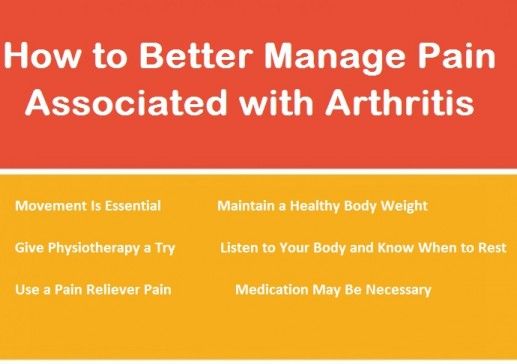Have you recently been diagnosed with arthritis and want to be sure you’re taking all the right steps to limit the pain and discomfort that it causes? Perhaps you’ve been combating arthritis for years but it has just recently progressed and now you’re dealing with increased pain.
Have you recently been diagnosed with arthritis and want to be sure you’re taking all the right steps to limit the pain and discomfort that it causes? Perhaps you’ve been combating arthritis for years but it has just recently progressed and now you’re dealing with increased pain. The pain associated with arthritis can be so pronounced that it can have a dramatic and negative effect on your everyday life. Instead of letting arthritis call the shots, why not try a variety of methods meant to reduce the pain and help you to better cope and manage.
Movement Is Essential
When you're in pain and your arthritis is affecting your ability to function, it can be hard to motivate yourself to get up and get moving but that is exactly what you need to do. Staying mobile helps to keep the joints lubricated and promote flexibility. Experts suggest focusing on light stretches and low-impact activities such as walking.
If you go days without moving and exercising, your joints can stiffen, which can lead to more pain and inflammation.
Maintain a Healthy Body Weight
One factor that can heighten the pain associated with arthritis is being overweight. That excess weight puts pressure on your joints and muscles, which then adds to the level of pain you're suffering from. It’s a good idea to speak to your doctor so they can suggest what your ideal body weight should be.
Give Physiotherapy a Try
It can also be well worth your time to look into physiotherapy as a treatment option.Physiotherapy will help you to improve function and mobility - both of which can be impacted due to arthritis. You will learn strengthening exercises and stretches, it can improve your joint function and help to relieve pain. Your physiotherapists will also show you several exercises and movements you can do at home so you can continue on the path to long-term success and pain management. You can visit places such as Enhanced Physio.
Listen to Your Body and Know When to Rest
Movement and activity are important, but you also have to know when enough is enough. You don’t want to push yourself so far that the pain becomes worse and you potentially injure yourself. Finding that happy medium between not enough and too much exercise will be a bit of a learning curve but is necessary.
Use a Pain Reliever Pain
Did you know there are many products on the market that are meant to reduce pain and inflammation? These are topical solutions meant to numb the area, they can bring down swelling and can work for hours at a time.
Medication May Be Necessary
Depending on how severe your pain is, you may also need prescription medication. This treatment is reserved for more serious forms of arthritis, as doctors tend to prefer lifestyle changes are made first.
The main takeaway is that coping with arthritis and reducing your pain is possible. It’s all about finding the treatment paths that work best for you.












*********raj142@gmail.com
This website is a stunning design work, and I am ecstatic to have found it. They're a vital source of information. It's impressive that you've shared the type of information that you provide. Thanks! escorts in Sangrur, escorts in Barnala, escorts in Hoshiarpur, escorts in Faridkot, escorts in Firozpur